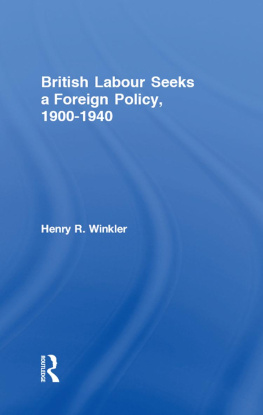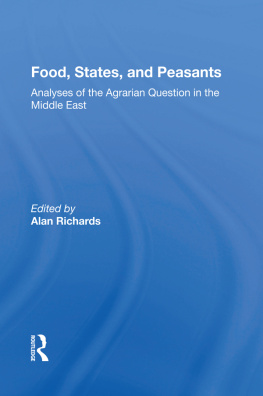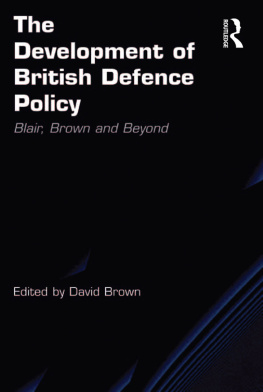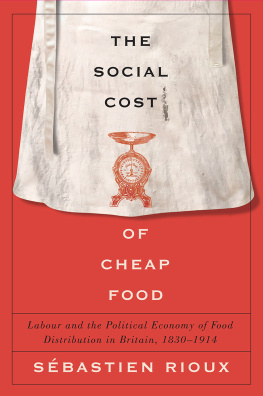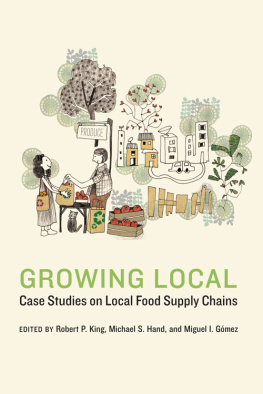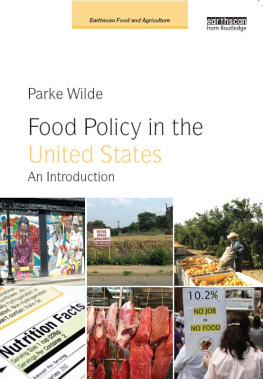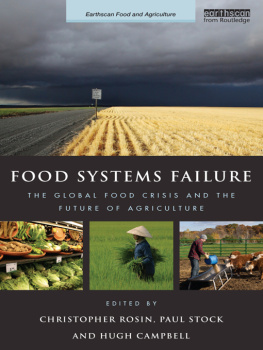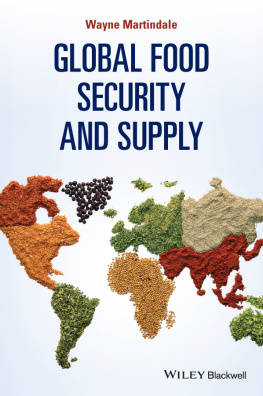ROUTLEDGE LIBRARY EDITIONS: THE FIRST WORLD WAR
Volume 1
BRITISH FOOD POLICY DURING THE FIRST WORLD WAR
BRITISH FOOD POLICY DURING THE FIRST WORLD WAR
L. MARGARET BARNETT
First published in 1985
This edition first published in 2014
by Routledge
2 Park Square, Milton Park, Abingdon, Oxon, OX14 4RN
and by Routledge
711 Third Avenue, New York, NY 10017
Routledge is an imprint of the Taylor & Francis Group, an informa business
1985 L. Margaret Barnett
All rights reserved. No part of this book may be reprinted or reproduced or utilised in any form or by any electronic, mechanical, or other means, now known or hereafter invented, including photocopying and recording, or in any information storage or retrieval system, without permission in writing from the publishers.
Trademark notice: Product or corporate names may be trademarks or registered trademarks, and are used only for identification and explanation without intent to infringe.
British Library Cataloguing in Publication Data
A catalogue record for this book is available from the British Library
ISBN: 978-0-415-74924-4 (Set)
eISBN: 978-1-315-77961-4 (Set)
ISBN: 978-1-138-01645-3 (Volume 1)
eISBN: 978-1-315-78101-3 (Volume 1)
Publishers Note
The publisher has gone to great lengths to ensure the quality of this reprint but points out that some imperfections in the original copies may be apparent.
Disclaimer
The publisher has made every effort to trace copyright holders and would welcome correspondence from those they have been unable to trace.
British Food Policy During The First World War
L. MARGARET BARNETT
Boston
GEORGE ALLEN & UNWIN
London Sydney
L. Margaret Barnett, 1985.
This book is copyright under the Berne Convention.
No reproduction without permission. All rights reserved.
Allen & Unwin, Inc.,
Fifty Cross Street, Winchester, Mass. 01890, USA
George Allen & Unwin (Publishers) Ltd,
40 Museum Street, London WC1A 1LU, UK
George Allen & Unwin (Publishers) Ltd,
Park Lane, Hemel Hempstead, Herts HP2 4TE, UK
George Allen & Unwin Australia Pty Ltd,
8 Napier Street, North Sydney, NSW 2060, Australia
First published in 1985.
Library of Congress Cataloging in Publication Data
Barnett, L. Margaret.
British food policy during the First World War.
Bibliography: p.
Includes index.
1. World War, 1914-1918Food supplyGreat Britain.
2. Great BritainEconomic policy. I. Title.
HD9011.6.B37 1985 338.1941 85-3920
ISBN 0-04-942189-1 (alk. paper)
British Library Cataloguing in Publication Data
Barnett, L. Margaret
British food policy during the First World War.
1. Food supplyGovernment policyGreat BritainHistory20th century
2. World War, 1914-1918Great Britain I. Title
338.1941 HD9011.6
ISBN 0-04-942189-1
To my parents
During my research I had frequent cause to be grateful for assistance and advice given me by the archivists and staffs of the libraries and record depositories I visited. I also wish to thank the following for permission to quote from papers and manuscripts to which they own the copyright: the Viscount Astor (papers of W. W. Astor); Milton Gendel (E. S. Montagu); Mrs. S. Sokolov Grant (A. Grant Duff); Dr. A. Mackenzie and David Oberlin-Harris (Rev. Andrew Clark); Baron Mottistone (J. E. B. Seely); the Earl of Selborne (Lord Selborne); the Beaverbrook Foundation and the Clerk of the Records, House of Lords Record Office (A. Bonar Law, D. Lloyd George); the British Library of Political and Economic Science (W. H. Beveridge, E. M. H. Lloyd); the Master, Fellows and Scholars of Churchill College in the University of Cambridge (M. P. A. Hankey); the Labour Party (Consumers Council, War Emergency Workers National Committee); the London School of Economics and Political Science (the diary of Beatrice Webb); the Warden and Fellows of New College, Oxford (Lord Milner); the Royal Society; Times Newspapers Ltd. (Lord Northcliffe); the University of Birmingham (A. Chamberlain); and the University of Newcastle (W. Runciman). Transcripts of Crown copyright records in the Public Record Office and elsewhere appear by permission of the Controller of Her Majestys Stationery Office. Quotations from the diaries of Ramsay Macdonald are made with the understanding that the contents of these diaries were, in Macdonalds words, meant as notes to guide and revive memory as regards happenings and must on no account be published as they are.
This book began life as a doctoral dissertation and benefited considerably from the criticism and suggestions offered by members of my defence committee. The guidance of my department sponsor, the late Professor Stephen Koss, was particularly valuable. I also wish to thank Dr Derek Oddy of the London Polytechnic for his help in locating sources. Finally, my special thanks to my husband.
The research for this book was made partially possible by grants from the Wellcome Foundation and the Center for Food Policy Studies, Columbia University, New York.
Assessing the reasons for the Allied victory in the First World War, David Lloyd George picked out civilian food supply as the ultimate deciding factor. It had been the Central Powers failure to maintain their supply, he wrote in his memoirs, that had lowered their resistance in 1918 and had hastened their defeat.1 In contrast, successful management of food resources was seen as having sustained the stamina and fighting spirit of the Allied nations, with advantageous consequences for the war effort. This contribution of food supply to the outcome of the war was an indication of how greatly the tactics of war had changed in recent years. In the past, wars between two or more sovereign states were largely confined to the battlefield and the high seas, where traditional military and naval forces fought matters out according to the conventions. Civilians usually had little else to do but offer encouragement from the sidelines, unless, of course, they were unfortunate enough to find themselves in the way of a marauding army or inhabiting a beleagured city. The war of 19141918 saw the civilian in the thick of things. The belligerent nations engaged in a no-holds barred contest in which whole economies were mobilized in support of the war effort. The enormous size of the armies fielded and the firepower of the new weaponry used demanded an unusual degree of organization at home to ensure that the military machine was fed and equipped. In addition, when the armies became mired in the futile stalemate of the trenches, all-out economic warfare was the means by which each side hoped to get the edge over the other. The Allies tried to deflect the enemys seaborne trade by imposing a surface blockade; the Central Powers introduced a newer and more effective means of stopping much needed imports from reaching their destination destruction of the opponents merchant ships by submarines. Within a very short time, the war had developed into a mutual siege in which, as Lloyd George pointed out, endurance proved the key to success.
Despite several potent assets in the form of the worlds strongest navy, a huge mercantile fleet and great wealth, Britain was the least well-prepared of the belligerents to fight a war of this kind. It was by far the most dependent on imported foodstuffs and other key raw materials and hence the most vulnerable to defeat by severance of its supply lines. Its agricultural sector was tiny and on the eve of war the country was importing over 60 per cent of its total food supply, no less than 80 per cent in the case of the wheat that formed the staple food of the bulk of the population. Stockpiling of supplies had never been thought necessary. Inevitably, food control assumed far greater importance in Britain during the war than in countries that had been self-sufficient or very nearly so in the years before the war.


